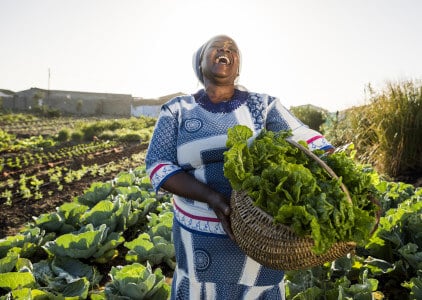by
This August, our nation will observe and lament a tragic anniversary: the arrival of enslaved Africans by boat to the British colony of Virginia in 1619. Within decades of that event, the chattel slavery of Africans was fully established in what would become the United States. As we mourn the centuries of oppression that ensued, I hope that we will also seize the moment and honor the myriad ways that Africans, and their descendants, have shaped our nation’s soul. In recent years, I’ve done so by exploring, documenting, and sharing the ways that African heritage people in the United States have shaped our country’s food story. Fortunately, many others have done, and continue to do, the same.
Despite our collective efforts, cuisines influenced by people of the African Diaspora (what I’m calling “African heritage cuisines”) remain relatively unsung in this country. Using August 2019 as a focal point, I’m urging all who love African heritage cuisines—culinary professionals, diners, and media content creators, to name a few—to engage in a grassroots effort to celebrate and promote our traditional foods. Yes, getting national media attention for African heritage cuisines is vitally important, but there are far more opportunities at the local level. Since my wheelhouse is creating media content, I offer the following suggestions for getting these stories in local media:
- Shine a Spotlight on the African American Experience in Your Community
A first, and necessary, step in this endeavor is to get your community to acknowledge the experience of its African American members. This may be a challenge, especially for communities with no direct experience with slavery, or places where the African American population is small. Some don’t want to deal with uncomfortable issues in a public space. Others may not want to revisit the pain. I was able to persuade a Colorado publication to publish a story for its August issue by showing that there were indeed enslaved African Americans living in the state before the Civil War, and that after
Emancipation, many African Americans migrated to the state. I followed this connection by showing how, in short order, these migrants influenced Colorado’s food scene.

White House cooks during the Truman Administration.
2. Show the Pivotal Role of African American Cooks
Sadly, most Americans are woefully ignorant of the contributions that African American cooks, by force and by choice, have made to a wide variety of American cuisines. For most of our nation’s history, whatever culinary context you can imagine, African Americans were usually the ones doing the cooking. The only that comes close to that kind of dominance is what we’re currently seeing from Latinx cooks in today’s restaurant kitchens. We can change that by creating media about the many individuals, past and present, who showed excellence at their culinary craft.

A typical soul food meal, Cora Faye’s Cafe, Denver, Colorado.
3. Inform Others about African Heritage Cuisines
More people need to know how, over four centuries, African Americans took the ingredients and culinary techniques from West Africa and applied them in the American context. Yet, the broader public really needs an education on what African heritage people eat within their own communities. I can’t tell you how many times someone has told me: “I’ve heard of soul food, but I don’t really know what it is.” Let’s get the word out about ingredients and culinary techniques that black people have used to create, or helped create, barbecue, Creole food, the Gullah-influenced low country cuisine of the Carolinas, soul food, and southern. Why stop there? Let’s also promote the other flavors from the Sub-Saharan African Diaspora: Brazilian food, Caribbean food, South African cuisine, and countries within West Africa. Thanks to the recent accolades showered on some very talented chefs, African heritage cuisines may finally move from “trending” to “sitting comfortably in the mainstream.”

Southern fried tofu, vegan mac ‘n’ cheese, and collard greens, Souley Vegan, Oakland, California.
4. Investigate the current trends within a cuisine
African heritage cuisines are not static, but a dynamic interplay between cooks and diners, adapting to different places, tastes, and trends. Within soul food alone, there are five trends. The traditional cuisine, in all of its meat-laden, fried, smothered, and sugary glory, is being reinterpreted. Cooks are respectively trying to make traditional soul food healthier, more extravagant, fusing it with other cuisines, or applying the techniques of molecular gastronomy. Other African heritage cooks are surely playing around with other diasporic cuisines. Let’s showcase their creativity.

Guests at an event at the Gantt Center in Charlotte, NC, sampling food made by
James Beard Award-nominated chef Greg Collier.
5. Show some love
Lastly, when someone engages the broader public to honor African heritage cuisines, we need to support them. We need to consume their media content and share it with others. We need to dine in restaurants that feature African heritage cuisines, and show them some love in online customer reviews. We need to encourage and support creative culinary events like the Soul Food Sessions dinner series in Charlotte, North Carolina, or the Gumbo Jubilee in New Orleans, Louisiana. Our collective work and vigilance will mark a solemn anniversary and mark the significant contribution that African heritage cooks have made on the American palate. They’re national treasures, and we should acknowledge them as such!


